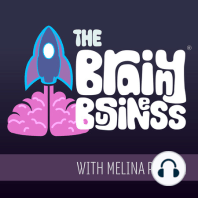47 min listen

116. Designing for Behavior Change, Interview with Dr. Steve Wendel
FromThe Brainy Business | Understanding the Psychology of Why People Buy | Behavioral Economics
116. Designing for Behavior Change, Interview with Dr. Steve Wendel
FromThe Brainy Business | Understanding the Psychology of Why People Buy | Behavioral Economics
ratings:
Length:
42 minutes
Released:
Sep 4, 2020
Format:
Podcast episode
Description
Today I am very excited to introduce you to Steve Wendel, author of Designing for Behavior Change, head of behavioral science for Morningstar, founder, chairman of the board for Action Design Network, and more. In today’s chat, you will hear about confirmation bias, the power of novelty and story, behavior change, the IKEA effect, incentives, and more. There are links to all those past episodes, details about the new Certificate in Applied Behavioral Economics from the Texas A&M Human Behavior Lab (where Melina is now teaching), and information about Steve in the notes below. I really loved talking with Steve, he is such a wealth of information and I know you are going to enjoy every second of his thoughts and insights. Show Notes: [00:41] Today I am very excited to introduce you to Dr. Steve Wendel, author of Designing for Behavior Change, head of behavioral science for Morningstar, founder, chairman of the board for Action Design Network, and more. [01:54] In today’s chat, you will hear about confirmation bias, the power of novelty and story, behavior change, the IKEA effect, incentives... [03:49] Designing for Behavior Change is a manual Steve wrote for his team at the time. [05:55] In the book he shares knowledge as well as what you do to put the knowledge into practice. [07:53] Steve has a PhD in political science, but he studied under an experimentalist and did many field experiments in political behavior. [09:26] Steve shares the story of the fish stranded on the beach that emphasizes the ways we can drive behavior change. [10:47] The yelling, screaming, and educating are all about the wrong value proposition. When we are trying to help somebody do something the value proposition is key. [13:04] You don’t fundamentally change human behavior, you work with it. [14:49] A lot of people think that you want to take the conscious decision making out of it. A level of awareness is important and taking that physical action matters. [16:01] CREATE is an acronym for the steps people need to take conscious action. DECIDE is step by step determining the problem and crafting the intervention. [17:28] Your product and your communication are competing with every other single possible thing the person could be doing (including Bigelow-watching Netflix). [19:41] It is not about getting people’s attention, but finding their attention and being there for them. [22:14] First, we have to get clarity on what we want to accomplish. That is defining the problem. Second, we have to put all that aside and look at the micro behaviors our customers are going through and might get in their way. [24:18] Steve shares one of his favorite research stories about running a competition about foreign ATM fees. [27:14] Belief, passion, and investment have little to do with the impact on your users. You need to test in the field and see if you are actually helping people. [29:20] There are plenty of cool things companies and brands can do to boost their reputation. All of it is based on treating your people right. [31:03] Mission really matters. The key to the competition was that it was communal and fun. [32:46] Steve is particularly interested in the intersection between behavioral science and data science right now. [33:31] Behavioral science and data science are trying to accomplish different things Data science is often in a business setting is about prediction and is broad. Behavioral science is fundamentally narrow and focuses on behavior change. [36:03] There is a lot of work that is being done and people are finding each other because we are currently in this differing space. [37:43] Many people were feeling fatigued during the early days of the pandemic because they were not able to rely on their habits in their everyday lives. [39:22] Getting our kids on routines can actually help them and us. [40:28] Steve is the head of behavioral science at Morningstar. He has one of the larger teams doing applied research and
Released:
Sep 4, 2020
Format:
Podcast episode
Titles in the series (100)
10. On Air Strategy Planning Session with Mariel Court: In this behavioral economics podcast it is time to apply what I have been talking about in the first 9 episodes through this very first on air strategy session, featuring my guest Mariel Court. Mariel is someone I met in the BizChix Coop (which is... by The Brainy Business | Understanding the Psychology of Why People Buy | Behavioral Economics